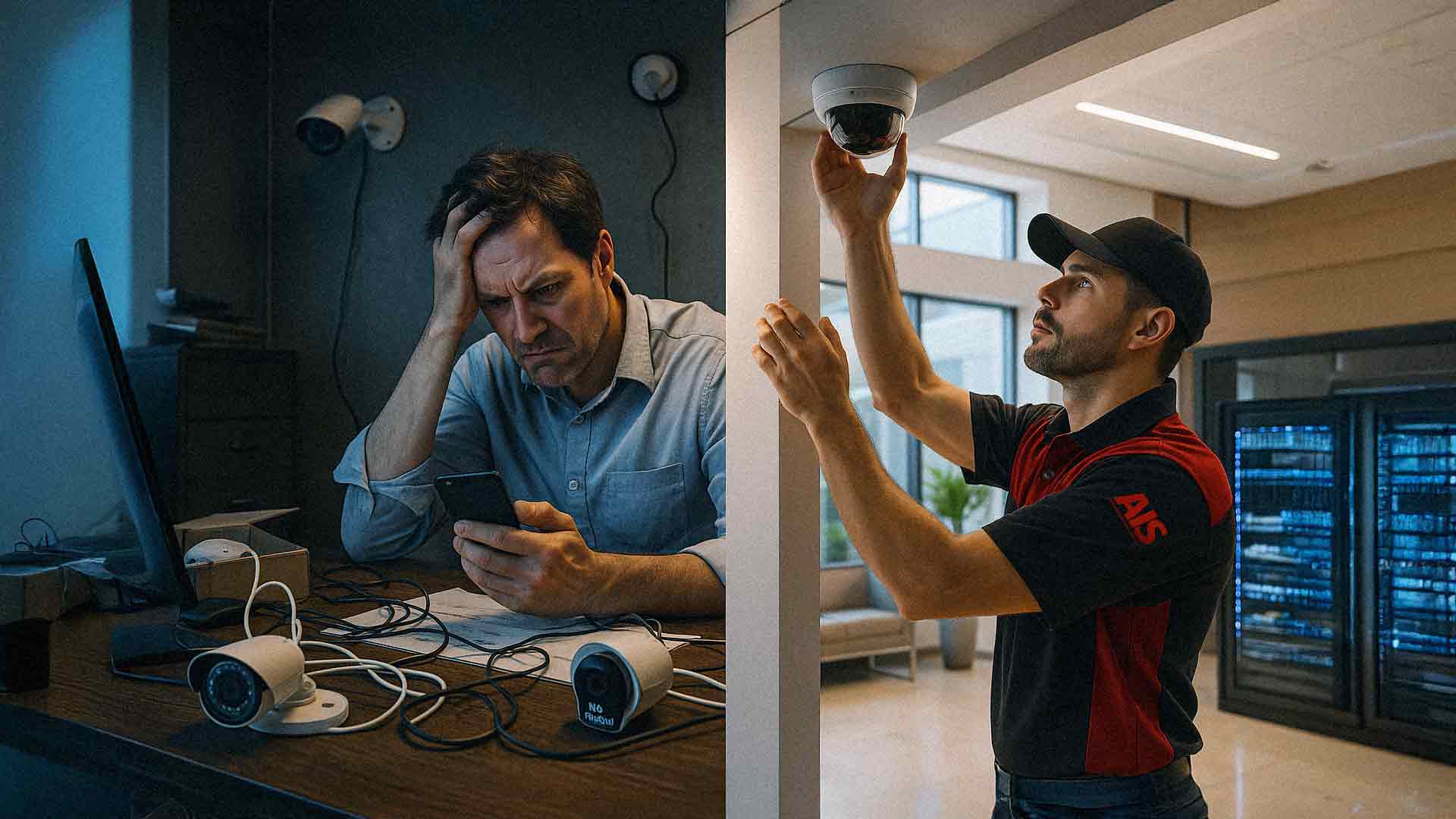DIY Security Cameras vs Professional Installation: What’s the Real Difference?
July 7th, 2025 | 7 min. read

You’ve probably seen the ads: “Install your own security cameras in under 15 minutes.” Or maybe a YouTube tutorial convinced you it’s easy, affordable, and just as good as what the pros use.
For homeowners, that might be true.
But if you're protecting a business (one with employees, customers, equipment, inventory, or even legal compliance requirements). In that case, the decision to go DIY with your security cameras isn’t as straightforward as it may seem.
At AIS, we’ve worked with hundreds of businesses across Las Vegas and Southern California. Many of them came to us after trying to go the DIY route first.
And what we’ve seen over and over again is this: the difference between a DIY camera kit and a professionally installed system isn’t just in the wiring. It’s in the performance, the reliability, and the peace of mind you get when it counts.
Let’s walk through the fundamental differences and help you decide what’s right for your business.
DIY vs. Professional Install for Security Cameras: Why This Question Is Coming Up More Often
The security camera market has experienced significant growth over the past decade. With systems like Ring, Arlo, and Blink dominating retail shelves and Amazon product pages, it’s never been easier to buy a few cameras, connect them to your Wi-Fi, and watch live footage from your phone.
It’s appealing. It feels modern. And in some cases, it’s “good enough.”
However, it’s essential to understand where these systems excel and where they fall short, primarily when your business depends on security that works when something goes wrong.
Because no one cares how cool the app is if the video is blurry, missing, or didn’t record at all.
Business Security Camera Installation: Quick Mount vs. Full System Design
DIY systems are built for simplicity. That’s the whole pitch. Stick a camera on the wall, plug it in, download the app, and you’re live.
The problem? That simplicity often creates gaps.
We’ve seen businesses miss major blind spots because they placed a camera where it looked convenient, not where it made sense from a security perspective. Others have experienced Wi-Fi signal issues that cause recordings to cut off or leave cameras offline without notice.
Professional installations, by contrast, start with a complete site assessment. A trained technician evaluates your space, identifies high-risk zones, and designs coverage that minimizes blind spots. The system is wired (or securely configured for wireless) and tested for consistent connectivity, ensuring it complies with local codes and industry regulations.
So, while DIY may be faster to install, professional systems are designed to operate reliably and consistently.
Camera Equipment Quality: Consumer-Grade vs Commercial-Grade
Let’s talk gear!
Most DIY systems use consumer-grade cameras. That’s not always a bad thing; for small spaces or low-risk scenarios, they can work fine. However, these cameras typically come with limited video resolution, narrow viewing angles, and reduced night vision capabilities.
And let’s not forget durability. Consumer cameras are not built to withstand harsh weather, vandalism, or long-term outdoor exposure.
Professional systems, on the other hand, are designed for demanding environments. You’ll typically get:
- Higher resolution (1080p, 4K, or better)
- Wider fields of view
- Enhanced low-light or night vision performance
- Tamper-resistant hardware
- Encrypted data storage
If video quality matters (and let’s be honest, it always matters after something bad happens), commercial-grade equipment is built for the job.
Security Camera Monitoring and Remote Access
One of the most significant selling points for DIY systems is mobile access. You can open an app, view a live feed, and even communicate with someone through two-way audio.
That’s great. But it also comes with limitations.
DIY platforms are often optimized for a single user or account. If you need multiple users, multiple locations, or centralized control over who can view what, it becomes complicated quickly.
And while DIY apps do offer notifications, they aren’t always reliable. We’ve seen numerous business owners who missed alerts or were unable to access footage when they needed it.
Professional systems offer secure remote access with multi-user dashboards, custom permissions, and centralized control. That means you can give your managers access to specific cameras, limit what employees can view, and monitor multiple locations from a single interface, all without compromising security.
You can also integrate those systems with alarms, access control, or other business software for even greater efficiency.
Access Control Support and Troubleshooting: Forums vs Field Technicians
With DIY cameras, support typically involves searching through help forums or emailing a support desk that may take hours or days to respond. And if a camera dies, you’ll likely be expected to remove it yourself, ship it back, and install a replacement.
When you work with a professional installer like AIS, help is local. If there’s an issue, we can dispatch a technician to your site. We handle system updates, performance checks, and troubleshooting so you’re not stuck trying to figure out why your footage isn’t recording or your notifications stopped working.
In business, downtime is expensive. Fast, responsive support isn’t a bonus, it’s a requirement!
Common Issues with DIY Security Camera Setups
We don’t want to make assumptions, but here’s what we regularly see when we take over failed DIY systems:
Unreliable Wi-Fi
Cameras can drop offline due to signal interference, building materials, or bandwidth issues. A single router often can’t handle multiple video streams reliably, especially in larger commercial spaces.
Incomplete Coverage
DIY users often don’t realize where cameras should go for proper coverage. They miss key entrances, leave blind spots in alleys or storage areas, or don’t account for glare and lighting changes throughout the day.
Storage Failures
Most DIY systems store footage on SD cards or in limited cloud accounts. When storage runs out or fails, older footage is lost, sometimes without warning.
Poor Video Quality
In the moment that matters most (like during a break-in or vandalism), the footage is blurry, dark, or unusable for legal or insurance purposes.
Cost Comparison: What Are You Paying For?
DIY Systems
Expect to spend $150 to $500 on a multi-camera kit. That price often includes a basic mobile app, short-term cloud storage, and little to no professional guidance. Ongoing costs may apply if you want longer video retention or extra features.
You’ll also be doing the installation yourself. If you make a mistake (such as incorrect placement, exposed cabling, or inadequate power setup), it could impact performance or reduce the lifespan of your gear.
Professional Installation
A professional system can range from $2,000 to $8,000 or more, depending on the size of your building, the number of cameras, and the level of integration required. That includes:
- Commercial-grade equipment
- Professional installation and configuration
- Secure storage (on-site or cloud-based)
- Support and maintenance
- Optional monitoring or service plans
It’s an investment, yes. But one that pays off in reliability, performance, and peace of mind.
Over a three to five-year period, professional systems typically require fewer replacements, less downtime, and fewer costly surprises.
When DIY Camera Installation Might Make Sense
We’re not here to say every business must use a professional system. There are situations where DIY might work just fine:
- You’re securing a small office or retail booth
- You only need cameras temporarily
- You’re tech-savvy and don’t mind troubleshooting
- You’re okay with some limitations in quality or reliability
If that’s your situation, DIY could be a reasonable short-term solution.
However, for most commercial spaces (especially those with multiple entry points, valuable assets, or high staff and customer traffic), the risk of a DIY system failing at the wrong time is simply not worth it.
Why AIS Recommends Professional Installation for Most Businesses
We’ve been in this space long enough to know what happens when corners are cut.
We've seen businesses lose evidence of a break-in because the storage card was full. We've talked to owners who didn’t know a camera had stopped recording weeks ago. We’ve helped companies out of tough spots because their system couldn’t provide what they thought it could.
That’s why we don’t just install cameras, we curate complete security solutions. Our local team visits your site, identifies your risks, and recommends a system that matches your building, budget, and goals. And when you need help, you call us, not a 1-800 number or a support bot.
Final Thoughts: Choose the Right Business Security System for Your Needs, Not Just Your Budget
Security isn’t something you want to compromise on. It’s not just about surveillance; it’s about protecting your people, your property, and your peace of mind.
DIY security cameras can be effective in the proper context, but they often leave businesses vulnerable, sometimes without even realizing it.
Professional systems come with a higher upfront cost, but that cost buys reliability, coverage, and long-term value.
Still unsure which direction to take?
Contact AIS for a free consultation. We’ll walk your site, explain your options, and help you decide what makes the most sense for your business: no pressure, no jargon, and no cookie-cutter quotes.
A true southerner from Atlanta, Georgia, Marissa has always had a strong passion for writing and storytelling. She moved out west in 2018 where she became an expert on all things business technology-related as the Content Producer at AIS. Coupled with her knowledge of SEO best practices, she's been integral in catapulting AIS to the digital forefront of the industry. In her free time, she enjoys sipping wine and hanging out with her rescue-dog, WIllow. Basically, she loves wine and dogs, but not whiny dogs.
Topics:



